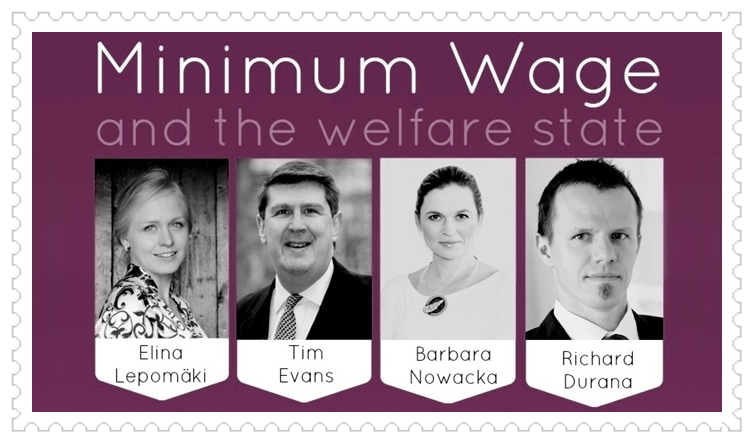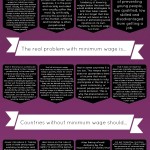We have the pleasure to present you the second round of #4discussion – a new project by 4liberty.eu network, the aim of which is to engage in discussion about the current social, political and economic issues, as well as liberal ideas, renowned individuals of different professional backgrounds from all around Europe and beyond. The second #4discussion we devote to the topic of minimum wage and the welfare state. See what do Elina Lepomäki, Professor Tim Evans, Barbara Nowacka, and Richard Durana have to say on the topic and feel free to comment on that!
 Elina Lepomäki – Member of the Finnish Parliament, representing the National Coalition Party. Start-up entrepreneur and the Chair of the free-market think tank Libera.
Elina Lepomäki – Member of the Finnish Parliament, representing the National Coalition Party. Start-up entrepreneur and the Chair of the free-market think tank Libera.
Minimum wage as a tool of welfare state is… detrimental. Economists word widely are quite unanimous with the fact that setting minimum wages for industries create unemployment and thus welfare losses. Usually this creates high barriers for especially young people and many immigrant groups to enter the job markets as they usually lack the experience in work life. The unions issuing minimum wages create social exclusion, poverty and alienation for the underprivileged in the society. Minimum wages cause poverty.
The real problem with minimum wage is… that in the long run workers are paid according to their marginal productivity. In the case that marginal productivity of a worker is lower than the industry minimum wage, the worker gets unemployed against his or her will. Everyone should be allowed to work for a salary that they want! Usually workers productivity will rise when their experience increases. If we close this path, we will remove the “lowest steps” from this ladder of working experience.
Countries without minimum wage should… never impose them. Taking care of safe and proper working conditions and that no one works against his or her will (=slavery) should be guaranteed. The wage level of different countries have always steadily risen when their productivity have increased. Only the free-market policies of governments have made this possible.
Welfare state should… guarantee a basic income for everyone so that no one will suffer from hunger or diseases. Still the social security should be low enough to encourage one to attend the labour markets, but high enough to guarantee modest living standards. The welfare model should be as simple and as transparent as possible.
 Tim Evans – Professor of Business and Political Economy, Schools of Business and Law, Middlesex University London.
Tim Evans – Professor of Business and Political Economy, Schools of Business and Law, Middlesex University London.
Minimum wage as a tool of the welfare state is… often counter-productive. Under such auspices, it is the poor and socially excluded who usually suffer the most. By artificially pricing the poorest out of the market, suffering and hardship is often perpetuated unnecessarily.
The real problem with minimum wage is… that all minimum wage interventions socially exclude and keep in poverty those for whom more adaptive and open market approaches would otherwise encourage and support. Politically they sound lovely but sociologically they can be devastating to the most vulnerable and powerless in society. By simply removing the bottom rungs in a labour market’s employment ladder they can make people’s first steps to a job even more onerous and remote.
Countries without a minimum wage should… also focus on the rule of law, respecting property rights ‘in and of the person’ and developing welfare and regulatory approaches (market driven standards) without the state and its elite interests. The private supply of all manner of public (non excludable and non rivalrous) goods is also crucial in building a healthy, prosperous and sustainable future.
Welfare state should… now transition to more sustainable and beneficial models of market based welfare so as to genuinely help and support those in need. Given levels of global sovereign debt, we are going to need more and better forms of collective self-help beyond mere tax funded politics.
 Barbara Nowacka – Chancellor of the Polish-Japanese School of Information Technology, social activist and a former European Parliament election candidate.
Barbara Nowacka – Chancellor of the Polish-Japanese School of Information Technology, social activist and a former European Parliament election candidate.
Minimum wage as a tool of welfare state is… indispensable in places where employers have a tendency of lowering wages below the level that would enable employees to fulfil their basic needs. Let’s not forget that free market will never act as a means of eliminating social injustice on its own. Therefore, minimum wage is a must.
The real problem with minimum wage is… that in some countries it is too low. This means that it does not guarantee a level of income that would enable individuals to fully participate in the life of a given community, or prevent pauperisation and social exclusion. This is why the phenomenon of the working poor occurs.
Countries without minimum wage should… stop being afraid. Judging by the experience of states that have introduced minimum wage quite recently, eg. the United States or Great Britain, minimum wage has a stimulating effect on the economy. After initial positive results, minimum wage is gradually increasing.
Welfare state should…offer as a form of state’s benevolence not only social welfare, but also provide social security, subsidies and social services (kindergartens, nurseries, healthcare) to all inhabitants of a given country, regardless of their financial status.
 Richard Ďurana – Director of the Institute of Economic and Social Studies (INESS) in Slovakia.
Richard Ďurana – Director of the Institute of Economic and Social Studies (INESS) in Slovakia.
Minimum wage as a tool of welfare state is… an excellent way of preventing young people, low qualified, low skilled and disadvantaged from getting a job.
The real problem with minimum wage is… that it does not meet the objectives originally intended by its advocates. On contrary, increasing the minimum wage is only a trade-off in which we exchange higher salaries for some workers for the loss of jobs of others. Minimum wage increases the unemployment rate, which is particularly significant among the groups it actually intends to protect. Also, it does not reflect differences between regions and distorts the labor market in the poorer regions more than in the richer ones.
Countries without minimum wage should… not get fooled by countries which introduced – often under the pressure of international contest of being as socially “developed” as possible – the minimum wage which then harms the labor market. They should carefully monitor the development in other countries in terms of communicating the effects of the minimum wage on labor market to their citizens, because, usually, public debates are based on emotions rather than on real evidence.
Welfare state should… replace the minimum wage with social contributions deduction for low-income employees. This measure will help both low-skilled and young job seekers, and employers. If there is not enough political courage to abolish the minimum wage, an alternative proposal with a positive impact on the job creation is to suspend the minimum wage in regions with unemployment rate of over 10% and for people of the age under 30.
Or you can simply enjoy the infographic:




